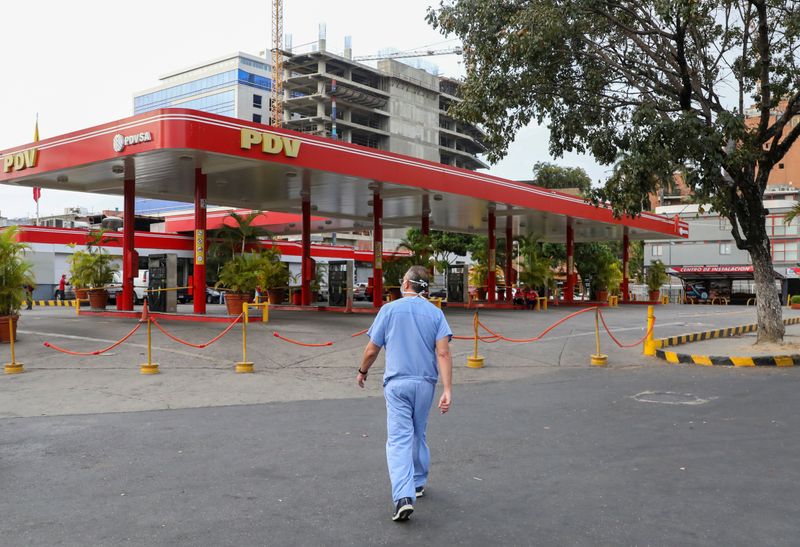By Marianna Parraga, Luc Cohen and Matt Spetalnick
(Reuters) - Gasoline shortages in Venezuela are worsening after U.S. officials have told foreign firms to refrain from supplying the fuel to the sanctioned South American nation and only provide diesel, according to five people familiar with the situation.
Since late 2019, U.S. officials have asked most of Venezuela's fuel suppliers to avoid sending gasoline to the crisis-stricken nation. In the latest round of calls in early March between U.S. officials and oil firms, they repeated the ban, despite worsening humanitarian conditions in the country, one of the sources said.
The U.S. Treasury Department sanctioned Venezuela's state-run Petroleos de Venezuela [PDVSA.UL] over a year ago as a measure to oust socialist President Nicolas Maduro, who Donald Trump's administration considers a dictator usurping power.
A handful of foreign companies - including Russia's Rosneft (MN:ROSN), Spain's Repsol SA (MC:REP), Italy's Eni SpA (MI:ENI) and India's Reliance Industries (NS:RELI) - continued to supply fuels to PDVSA under swap arrangements for Venezuelan crude oil, which was allowed by the U.S. Treasury.
"They underlined the message of no gasoline as part of oil swaps," said the source familiar with last month's calls, adding that his firm has only supplied diesel and gas oil since September.
While the officials did not explain why they were distinguishing between the two fuels, diesel is mainly used for power generation and bulk transport of cargo including food, while gasoline is mostly used for personal travel.
With the coronavirus pandemic wreaking havoc across the world, Washington has come under pressure from the United Nations human rights chief and U.S. lawmakers to relax sanctions on countries like Venezuela and Iran to facilitate the shipment of humanitarian goods.
A senior Trump administration official said that Maduro alone was responsible for the humanitarian toll in Venezuela and the United States would continue its campaign to cut his lifelines.
The restriction on crude oil-for-gasoline swaps with Venezuela is being maintained as the country's own once-formidable refining industry collapses, with almost no gasoline produced in recent months, leading to chronic shortages across the country.
To increase the pressure on Caracas, the United States this year sanctioned PDVSA's main trade partners Rosneft Trading and TNK Trading International, both subsidiaries of Rosneft.
Rosneft stopped direct trade with PDVSA in March and weeks later announced it would transfer all its Venezuelan assets to an undisclosed entity controlled by the Russian government.
"The swaps were working quite well," said Francisco Monaldi, an energy economist at Rice University, adding that the recent escalation in sanctions would spook suppliers. "In these circumstances, it is unlikely that established companies will take the risk."
A U.S. official acknowledged pressure has been exerted on some oil firms in line with efforts to get them to unwind their business in Venezuela or else face U.S. secondary sanctions.
The official, speaking on condition of anonymity, said Washington was prepared to accept a limited level of diesel supplies but wants to see a curtailing of gasoline shipments to Venezuela as part of Trump's "maximum pressure" campaign to oust Maduro.
U.S. officials have said privately Trump is frustrated at the failure of his Venezuela policy to break Maduro's grip on power.
In statements, both Repsol and Eni said they send PDVSA diesel, not gasoline, as part of their swaps. In March, Eni delivered two diesel cargoes, while Repsol sent one and Rosneft did not send any, according to internal PDVSA documents seen by Reuters and Refinitiv Eikon data.
Reliance did not immediately reply to a request for comment. The refiner shipped two gas oil cargoes in March to Venezuela according to exports data, which have not yet unloaded.
The U.S. State Department said U.S. sanctions do not restrict humanitarian aid "like food, medicine, and other donations intended to relieve human suffering."
PDVSA did not reply to requests for comment.
LONG STANDING PROBLEMS
Fuel shortages began well before the sanctions because of plunging refining in Venezuela, which has a total capacity of 1.3 million barrels per day (bpd) of crude processing.
Of that, PDVSA only refined 101,000 bpd of crude in March, according to an internal PDVSA document seen by Reuters, increasing the crisis-stricken nation's dependence on imports.
The vast majority of that went to produce diesel and jet fuel. The refineries produced just 7,000 bpd of 91-octane gasoline in March and 28,000 bpd in the first three months of the year. The 310,000-bpd Cardon and the 187,000 bpd Puerto la Cruz refineries remained completely halted.
Venezuela's government blames U.S. sanctions for restricting imports of additives and spare parts needed to run the facilities and has pledged to restart fuel output at the 146,000-bpd El Palito refinery.
The resulting shortages of motor fuel have disrupted shipments of food and preventing doctors from arriving to their hospital shifts.
Ana Veronica Herrero, a 32-year-old resident of the western city of Maracaibo, said she could not find gasoline to transport her mother to the hospital after she had a heart attack last Thursday.
"She died in my arms," Herrero said in a telephone interview, adding she later had to spend $45 to buy gasoline on the black market to bring her mother's body from the morgue to the cemetery.
